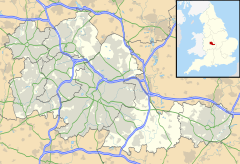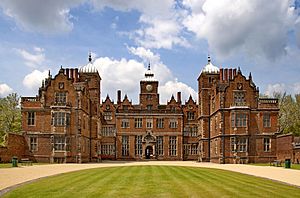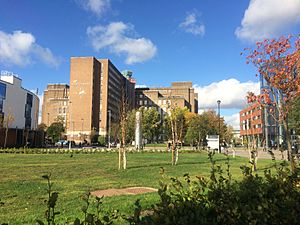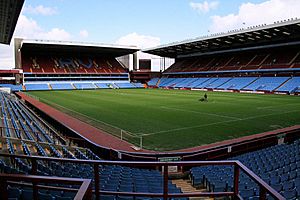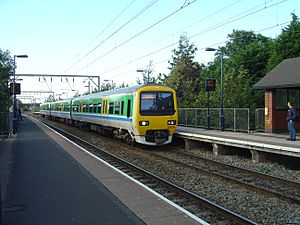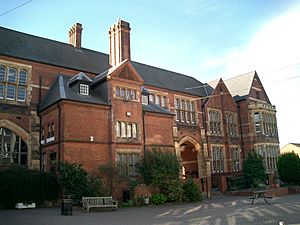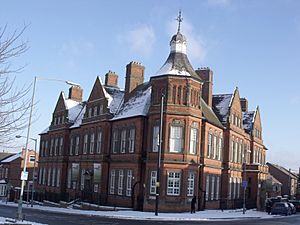Aston facts for kids
Quick facts for kids Aston |
|
|---|---|
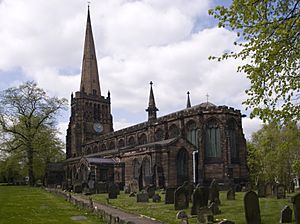 Church of SS Peter & Paul, Aston |
|
| Population | 22,636 (2011. Ward) |
| • Density | 10,833 per square mile (4,183/km2) |
| OS grid reference | SP072889 |
| Metropolitan borough | |
| Shire county | |
| Metropolitan county | |
| Region | |
| Country | England |
| Sovereign state | United Kingdom |
| Post town | BIRMINGHAM |
| Postcode district | B6 |
| Dialling code | 0121 |
| Police | West Midlands |
| Fire | West Midlands |
| Ambulance | West Midlands |
| EU Parliament | West Midlands |
| UK Parliament |
|
Aston is an area in the city of Birmingham, England. It is located just north-west of Central Birmingham. Aston is a special area, or "ward," within the city's local government. It is about 1.5 miles (2.4 km) from the very center of Birmingham.
Contents
Aston's Long History
Aston was first written about in a very old book called the Domesday Book in 1086. Back then, it was called "Estone." It had a mill, a priest (which meant it probably had a church), woodlands, and fields for farming. The Church of Saints Peter and Paul was built a long time ago, replacing an even older church. Most of the church was rebuilt between 1879 and 1890. Only the tower and spire, which were partly rebuilt in 1776, remain from the original medieval building.
The old area of Aston was very large. It was separated from Birmingham by a small road called AB Row. Aston was managed by a local group from 1869. It became an Urban District Council in 1903. Later, in 1911, it became part of the growing city of Birmingham. Another part, Saltley, was also added in 1911.
Old Buildings and Businesses
Some old buildings became very popular in Aston. These included the Aston Hippodrome, which was a theater, and Bartons Arms, a famous pub. Gospel Hall opened in 1892 but was taken down in the 1970s. A new one was built in 1979.
Aston also had many businesses. The Midland Vinegar Brewery, built around 1877, made vinegar. The Premier Motor Works made cars in the early 1900s. There was also a tramcar depot on Miller Street that could hold 104 tramcars! It opened in 1904 and helped people travel around the area.
Modern Aston: After World War II
After the Second World War, Aston changed a lot. A large part of South Aston was rebuilt. This area became known as "Newtown." It was a big housing area with many tall apartment buildings. Some of these buildings have since been taken down. This big project was approved in 1968.
Today, Aston is famous for giving its name to Aston Villa F.C. and Aston University. Even though the university is called Aston, its main campus is actually in Birmingham city center, about 1.3 miles south of Aston. Aston University is one of four universities in Birmingham.
Aston Villa F.C. has played at Villa Park since 1897. This football stadium is one of the biggest in England. It has hosted many important football games, both for clubs and international teams. Villa Park has also held other sports events, like rugby league and rugby union matches. It is a major attraction in the area.
Many of the houses in Aston are terraced houses. These were built around the late 1800s and early 1900s. Some of these houses were removed in the late 1960s to make way for the Aston Expressway. This road connects Birmingham city center to the M6 motorway.
In the early 1980s, many of Aston's terraced houses were old and needed repairs. They often lacked modern bathrooms and indoor toilets. There was talk of tearing them down. However, the Birmingham City Council provided money to homeowners to help them update their homes.
From 2001 to 2011, Aston had a big project called "Aston Pride." This project spent £54 million to improve the area. Many good changes happened, like reducing crime and building a new health center. The project also helped over 1,300 people find jobs.
Aston's People
In 2011, a count of the population found that 22,636 people lived in Aston. It is one of the most populated areas in Birmingham.
Aston is a very diverse community, meaning people from many different backgrounds live there. About 44% of the people were born outside the United Kingdom. The largest group of people are from Asian backgrounds, making up 69.1% of the population. Within this group, many are from Pakistan. The second largest group is Black British, and the third largest is White British.
The mix of people in Aston changed a lot in the 1950s and 1960s. Many people moved there from countries in the Commonwealth, especially from the Indian subcontinent and the Caribbean.
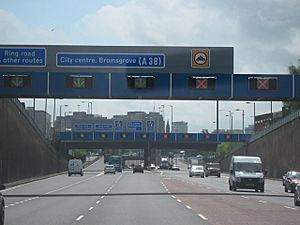
Aston has a younger population compared to the rest of Birmingham. About 33.5% of the people are under 18 years old.
Learning and Libraries
Aston has three secondary schools for older students:
- Broadway Academy, which was updated and reopened by the Duke of Kent in 2011.
- King Edward VI Aston, which is a special grammar school.
- Aston Manor School.
There are also seven primary schools for younger children:
- Aston Tower Community Primary School
- Birchfield Community School
- Manor Park Primary Academy
- Mansfield Green E-ACT Academy
- Sacred Heart Catholic Primary School
- Prince Albert Primary School
- Yew Tree Community School
Aston has two libraries: Aston Library and Birchfield Library. Aston Library was almost closed in 2017 to save money. However, after people spoke up, the decision was changed. Now, community groups help run the library.
Aston Cross Area
Aston Cross is a specific part of Aston. It used to be home to famous companies like Ansells Brewery and HP Sauce. Today, a large warehouse for East End Foods is located there. Aston Manor Brewery, which now makes cider, started nearby in 1982. Its founders were former employees of Ansell's.
From 1956 to 1969, Aston Cross was also where Associated Television (ATV) had its studios. Later, the building became home to radio stations like BRMB and XTRA-AM. BRMB was one of the first local radio stations in the UK and was very popular in the West Midlands. The building is still called Radio House.
Places to Visit in Aston
- Aston Hall
- Aston Reservoir
- Aston University
- Aston Villa Football Club and Villa Park
- Church of SS Peter & Paul, Aston
- Spaghetti Junction (a famous motorway interchange)
- King Edward VI Aston
- The former Norton motorcycle factory
Famous People From Aston
Many interesting people have connections to Aston:
- Pal Aron, an English actor, went to Prince Albert Primary School in Aston.
- All the original members of the famous heavy metal band Black Sabbath grew up in Aston. These include Ozzy Osbourne, Tony Iommi, Bill Ward, and Geezer Butler.
- The author Sir Arthur Conan Doyle, who created Sherlock Holmes, worked in the area for a short time.
- Lloyd Dyer, a former football player for Leicester City F.C., was born in Aston.
- Ateeq Javid, an English cricketer, went to Prince Albert Primary School and Aston Manor School.
- Victor Johnson (1883–1951) was a cycling champion. In 1908, he won a gold medal at the Olympics and became a world champion.
- Albert Ketèlbey, a composer, conductor, and pianist, was born in Aston in 1875.
- Harry Shelvoke, who helped start the company Shelvoke and Drewry, was born in Aston in 1877.
- John Benjamin Stone, a politician and photographer, was born in Aston.
See also
 In Spanish: Aston (Birmingham) para niños
In Spanish: Aston (Birmingham) para niños


